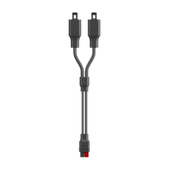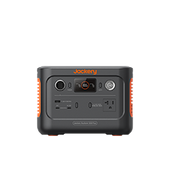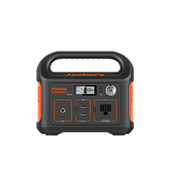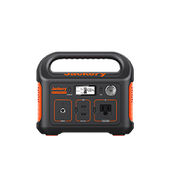










































































































































































































































JD Hill is an avid traveler who loves to spend his off-grid living time in his RV. When he is not camping, he is busy in his RV rental business, renting out RVs to those who want to enjoy the camping world. His book on dry camping paves the way for novices who want to get started with camping. It focuses on how everyone can use power and water efficiently to make their camping experience more rewarding. During his interview, JD shares how Jackery has made his camping trips convenient.
In nearly all situations, we lack power. There aren't any water spigots, and there's only a dump station going in and out. We do have a generator for times we need, but we'd prefer not to run it if possible. A couple of years ago, while planning for a trip, we concluded that we needed some auxiliary power to successfully pull the trip. So, I started looking for what many people call "solar generators." We looked at different manufacturers but were impressed by what Jackery offered.
My wife was the overriding decision maker on how much capacity we needed and what our wattage requirements were. The biggest consideration was our coffee maker, which required 1200-1500 watts, and the hair dryer, which required 1500 watts. Based on this, we decided on the Jackery Explorer 1500. Around the same time, we bought Starlink's Dishy McFlatface that uses 45 watts every hour. Basically, we run it from the time we wake up until we turn it off at night.
We do not want to run a generator (gas), nor do we want to be plugged in to do that. So what we do is — In the rear section of our motorhome, there's a window near one of the plugs connected to the inverter. There are only two plugs on the inverter other than the audiovisual — with one at the back of the window located near the inverter.
Rather than drilling holes in the side of the RV, I route my cables out of the window for fishing and two Jackery solar panels. In addition, we have two others — one attached to the RV roof and a portable one that can be moved around using a long extension cord in case there's no sunlight falling on the roof panels or when we need to charge batteries faster.
We have a propane fridge, so we don't use the residential refrigerator. We've had two issues when our fridge temporarily lost its functionality. Last year, the controller died, and we could run it only on electricity but not propane. So, I went to purchase a fridge controller and temporarily plugged it into my Jackery. I used a 15-foot extension cord from Jackery to the fridge and ran it until I could get a replacement controller.
Something similar happened last year when we went on a camping trip. Our propane tank was out of propane, and we had no way to charge the refrigerator. We were camping in a Forest Service campground that has about a dozen sites with access to power. So, we asked if they had one power site available for the remaining four days. They did have one, and we moved.
But we were again running our refrigerator in the electric mode using Jackery. In addition to charging other devices, Jackery saved our money twice when our refrigerator wasn't working for various reasons.
The biggest thing is not that anything crazy happens; it's that nothing out of the ordinary happens. As a side hustle, I rent out my RV to other people during winter. I also wrote a book on dry camping for my Facebook group. It's a two-page document — front and back — that reveals how to handle your power or water while dry camping. By following the instructions in the document, you can dry camp just fine!
When I analyzed the data for my fleets, I found that one-third of my reservations were dry camping. If RVers follow the dry camping protocol, they can handle their water efficiently. For example, take an eight-minute shower instead of ten and only do that every other day. But the power can be more of a challenge! I'm planning to lend my Jackery power station to renters, but I haven't made a decision yet.
I'm about to start the eighth season in my RV rental business, and my dry camping guide mainly covers how to manage power and water effectively. The power section of my dry camping instructions involves using solar panels and portable battery packs if they are available. I got a document if I send my Jackery out.
We also have smaller lithium-ion battery packs that we use mainly as an overnight thing to charge phones, tablets, and watches. So, when we look at the voltage indicator of the house batteries, they are still above 50% state of charge. I use the Jackery for the hairdryer, for the Internet, and for the coffee maker.
When I run my two small battery packs overnight, I connect them with my Jackery through the inverter plugs to recharge them for the next night. Then, I spend the day moving the solar panel around to catch as much sun as I can to power my Jackery. My biggest challenge is getting enough sun. You may think the sun always shines in Arizona, but it's also the rainy and monsoon season when there are seasonal storms. In this case, I have to run the generator and plug my Jackery to charge it around 70 to 80%.
I started with the spaceship, but I'm not sure if I want to buy one of them or spend a quarter million dollars on a rocket ride. If they're gonna fly me to space, they need to send me to Mars. I want to raise potatoes on Mars like in "The Martian" movie. Mark was so nasty by the time they finally picked him up because he had a loss of containment. He lost all the potatoes that he didn't have, which was his beginning to starve to death. I love that movie, and hence, I want to go to Mars.
Next year, we are planning to take a trip to Custer State Park — a place where we planned a honeymoon a long time ago. We're hoping to go back. We have gotten a lot of mileage out of Jackery. Having Jackery and having the ability to stream TV because we couldn't get our TV satellite to work and having everything we need is as easy as it is to go to an expensive campground every night.
We pay $17 a night for a campsite with no hookups because we are on a senior lifetime pass, and it gives us a big discount. In some areas, you can't get a campsite for less than $100 a night or so. Jackery gives us the ability to camp for basically nothing — something that we want. It gives us more money to spend on food or time to go to lakes with dogs.
More